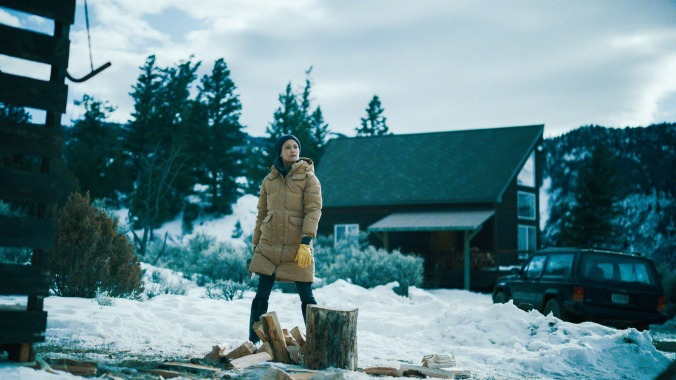God's Country is an unsettling place for Thandiwe Newton
The actor dazzles in a riveting, lyrical thriller set in an unforgiving American west

The rolling hills and icy plains of God’s Country are equal parts bleak and beautiful. In Julian Higgins’ feature directorial debut, co-written with Shaye Ogbonna, the mountains that were “there before people” serve as a Rorschach test for its characters: How do you survive this desolate wilderness? What past legacy or future promise do these lands hold? What are we owed, and what must we take for ourselves?
The hero of this modern-day morality tale grapples with such distinctly American questions in ways that white European settlers following their manifest destiny did not. A lyrical character study inside a quasi-Western thriller, God’s Country features a never-better Thandiwe Newton embodying that ethical struggle to haunting, unsettling effect.
Newton plays Sandra Guidry, a Black professor in a rural Montana college town. Originally from New Orleans, she splits time between her university and a solitary existence at a property on the edge of a national forest. Not long after the death of her ailing mother, a red truck appears in her driveway, setting off a series of escalating conflicts with men keen on hunting in the wilderness behind her house. The events of this story take place over seven days, each delineated with increasingly tense cuts to black. DeAndre James Allen-Toole’s score sneaks up on you, interwoven with a sound design from Zach Goheen that ratchets up the tension with each chapter: first the distant howling of wolves, eventually the nerve-jangling arrival of a freight train, even the ominous sounds of running water. Higgins, however, lets the bangs of gunshots create a bleak melody all their own.
From Sandra’s first standoff with the trespassers—one gruff but courteous (Joris Jarsky), one casually cruel (Jefferson White)—it’s clear she equates yielding ground with displaying weakness. While some might sort out neighborly conflict amongst themselves, as the town’s lone deputy (Jeremy Bobb) suggests to Sandra, she has no qualms about involving the authorities or, as the retaliations intensify, taking the law into her own hands. Piece by piece, we learn the reasons behind her tendency to “fight back, all the time,” as she urges a loyal student (Tanaya Beatty) in the film’s most riveting interlude.
Yet as cinematographer Andrew Wheeler’s spacious skies and purple mountain majesties remind us, this is America. The grieving Sandra’s trauma doesn’t need to be explosively dramatic; the mundane task of carving out a life here as a Black woman is traumatic enough. That’s at the heart of every conflict in God’s Country, from the way one of her interlopers dismisses her with a flicked cigarette to the impending vote for a new chair of her otherwise all-white, mostly male department. The specifics of Sandra’s backstory contextualize what we come to realize is her simmering rage, but by simply defying the status quo in this town her every word and gesture carries an electric undercurrent of unease. You might find Sandra prickly or paranoid, but you’d have to be a visiting extraterrestrial with no knowledge of a country whose legacy includes the genocide of indigenous Americans and the enslavement of Africans to not know why. It’s notable that Higgins updated his source material, James Lee Burke’s short story “Winter Light” (which the filmmaker also adapted into an award-winning 2015 short), to center on a woman of color like few Westerns have.
The gall of her trespassers’ rudeness, or her neighbor and colleague (Kai Lennox) daring to suggest she’s a diversity hire, further drives home the idea that there are men in this country who fear no consequences. I wouldn’t want to piss off Newton, but that may be because I’ve had the pleasure of watching her wield a katana on Westworld. She’s somehow both buttoned-up and utterly, transparently vulnerable, simultaneously revealing nothing and everything. By the time Sandra is following the truckers around town and to their door—“Why are you like this?” she spits, ultimately a rhetorical question—it’s clear this kind of escalating intimidation can only end with one of two outcomes. As much as we might want to see Newton explode and emote as we know she can, it’s her quiet calculation of each next move that keeps us on the edge of our seats. Most crucially, Sandra’s deliberations force us to ask what we’d do in her shoes.
That question is partly what makes Higgins’ stunner of a closing scene unlikely to leave your mind anytime soon. It’s one of many that plays with action happening just beyond our field of vision, letting tension fester in our imaginations, an apt conclusion to a thriller inviting residents of so-called God’s country to take a long, hard look in the mirror. It’s also fitting that the film’s one humorous note—the darkest of dark humor—is here, a moment that would feel like fantasy if it weren’t so brutally real, and as cold as this landscape. Higgins and Newton leave us with a bad taste in our mouths, and that’s a good thing. What choice do we have, they seem to be saying, but to manifest our own destiny?